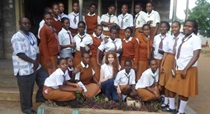Motivation of Kenyan students and teachers as the Key to Success
Ivana Uličná summarized her experience with voluntary internship in Kenya.

During my volunteer internship I had an opportunity to visit 10 secondary schools, where I could observe the real asset of our project in terms of development of students’ creativity and practical skills which are missing in traditional Kenyan education. However, I was intrigued by differences inequality of work and activity of ICT Clubs at the schools. What causes these performance differences and thus affects project efficiency? Is decisive the technology availability or how long they have been working with it? What affect does an academic success have on students? Does it reflect in quality of their work?
Awareness And Motivation Are Closely Related
Pontis Foundation project focuses on increasing the graduates’ employability through establishment of ICT Clubs and training companies to intensify technical and business skills of high school students. After visiting several schools, I noticed that some ICT clubs even despite participating in project for only half a year were sometimes doing better than those already participating four times longer than that. Also better technical equipment did not automatically bring better results of the clubs or companies. It also seemed that schools with students scoring above-average grades tended to fall behind when it comes to practical skills (e.g. the best academically performing school was a clear leader in our essay contest Ambassadors of Change, but in the consequent CV and cover letter writing competition performed below average).
This means that the reason must lie elsewhere. Two examples can be given for better understanding. The first one is a situation of a new partner school which began to lose members to sport clubs only a month after establishing the ICT club and training companies. Therefore during our visit with colleague Gift, who had also graduated from an ICT club, we focused on highlighting the benefits of membership in these clubs and training companies and their usefulness for real life after school. We explained the purpose of every single activity, what students should learn from it and how to use the gained skills in real life. Unemployment in Kenya currently moves around 40 percent, so people really appreciate any opportunity to gain a comparative advantage which could help them secure a job or establish a successful business. It turned out that in two weeks, attendance in the ICT club rose by 30 percent and even students, who had joined other clubs before, wanted to return to the club. Their activity and communication with our team also doubled, and has been kept on an excellent level for more than two months now.
In the second case, students of one of the new schools had obvious problems with presentation skills. Therefore, we focused on highlighting the usefulness of good verbal and non-verbal communication. We pointed out how these skills can be crucial for future job interviews, training or real company promotion, attraction of new customers, as well as during studies. It could also help them to secure a position in the training company and hence a certificate of a successful completion which is issued by the Slovak Centre of Training Companies and the Practice Enterprise Network. Since then, members of our ICT club have begun to google improvement techniques, present more often, and almost everyone wanted to participate more actively in discussions. Excellent progress has been observed during our next visit about four months later when students presented almost fearlessly and with a smile. In general, we observed that groups which did not understand benefits of the membership in our club or meaning of various activities, did not perform well, did not try their best and were less proactive. However, as soon as they learned about the meaning of the activities, as soon as they knew why they should carry out certain tasks and what they should learn from them, the quality of their work increased substantially. Students became more interested, more proactive and they tried to achieve better results and intensify work of the clubs. They learned more and remembered more. Hence, it can be concluded, that the key factor affecting the efficiency of this educational project is students’ motivation through their awareness of usefulness of acquired skills and knowledge.
Teachers as Carriers of Change
The same could be also observed in the clubs which had been showing excellent or less good results for longer period of time. What all the active clubs had in common was the initiative personality of a teacher who was genuinely interested in making a difference in students’ lives and who had a sincere effort to educate themselves as much as possible. These mentors often approached tasks with competitive spirit, which helped motivate even less proactive students.
Therefore, we can conclude that the project efficiency is not that much affected by technology, the duration of their membership in the project or the academic results of the students, but rather by their motivation by enthusiasm and active work of a teacher, who is thus a carrier of the change.
However, it is necessary to take into account that some of the schools did not even have electricity nor Computer Studies teachers in the beginning of the project. In many cases the teachers also lack knowledge about business or training companies. Thus, if teachers are to encourage and inform students in order to effectively meet the objectives of the project, it is necessary to familiarize them with all the important fields. Therefore, Pontis Foundation annually organizes study trips for the Kenyan teachers to Slovakia where they have the opportunity to see functioning of the training companies or integration of ICT in teaching practice. Slovak teachers also visit their Kenyan counterparts and train them in the field of project-based teaching, etc. More detailed information concerning the last training carried out in June 2014 could be found in the article “Impressions from our June trainings and school visits in Kenya” by Jakub Šimek.






